Ever wonder why your dog’s preferred sleeping spots are a little quirky?
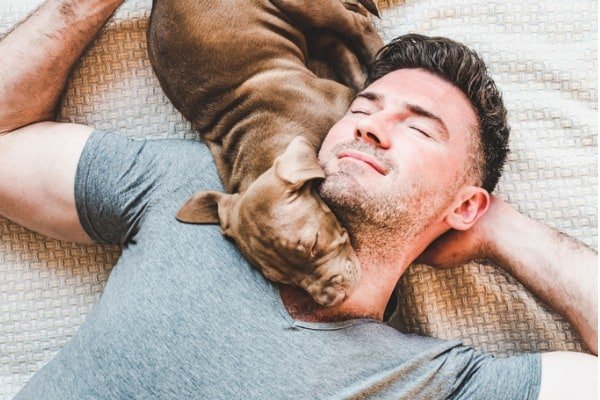
Dogs can seemingly get comfy in some awkward and amusing places – including on your head.
If your small dog or puppy is displaying this behavior, it doesn’t raise many issues aside from being a little confusing at times.
If you have a large dog who loves to sleep on your head, it can feel like they want to suffocate you.
However:
We can assure you that suffocation is the last thing on your dog’s mind – which can make it challenging to get them to understand why this sleeping position isn’t acceptable.
Why do they do it?
Aside from the discomfort factor, is there anything wrong with it?
We’ll answer that question – why does my dog sleep on my head – and cover how to address your dog’s inconvenient sleeping habits.
1. Dominant Behavior Versus Entitled Behavior
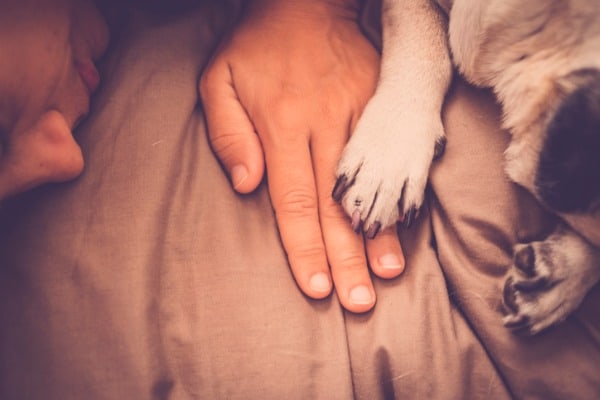
No judgment from us if your dog is on the spoiled side – dogs deserve to be treated like kings and queens.
Spoiling your dog too much can, of course, raise some issues.
The things your dog does as a result of not being given enough boundaries can sometimes be confused with dominant behavior.
How do you know it’s not dominant behavior?
The myth of dogs seeking to become alpha figures in their pack arose from their similarity to wolves, where a hierarchy exists in each pack.
In truth:
Domesticated dogs have a vastly different social structure than wolves, and unruly or bullying behavior is unlikely to be due to your dog wanting to become the boss of the household.
It’s understandable how a little entitlement can be mistaken for domination of the household, though.
Your dog setting up a bed on your head can make you pause and wonder if they’re trying to show you who’s in charge here.
We feel you:
The more likely explanation is that your dog thinks they’re allowed to do this. They haven’t been told that this is not the ideal spot for them to sleep.
A dog who likes to sleep on your head probably has a few “off-limits” areas in the house. They might be allowed on the furniture, in your bed, and have free roam of the entire space.
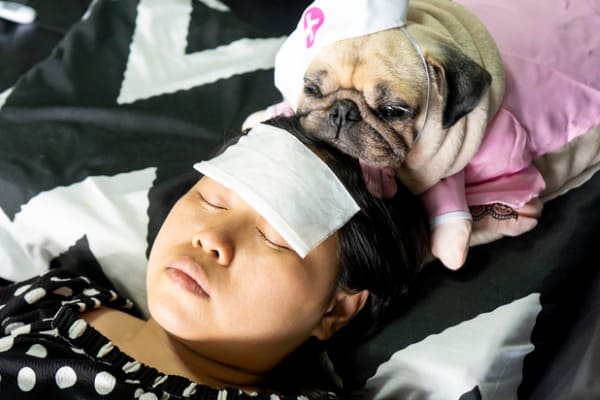
It’s okay to give a well-trained dog such privileges, and many households are happy with this type of dynamic.
You might even be content with a dog sleeping on your head type of arrangement – especially if they’re on the smaller side.
In fact:
Even if your dog does this because they’re a little spoiled, it’s not a big deal unless they object to you moving them.
Some dogs do this because they want to be closer to you, and you’ve allowed them to be, which is fine as long as everyone is comfortable.
The time to curb this behavior is if your dog begins to resource guard your head – as in, they believe your head to be their personal property and don’t want to listen to anyone’s objections in their presence.
The warning signs?
If you or anyone else tries to move your dog from the vicinity of your head and is met with growling, snarling, or snapping, then you know some boundaries need to be established.
Although dogs aren’t set on ruling the house, they can sometimes toe the line to find out how much you’ll let them get away with.
A dog who begins sleeping at the foot of your bed can slowly work their way up to your pillow and head.
It’s up to you, the pet parent:
Put your foot down if a dog sleeping on or near your head isn’t your ideal bedtime setup.
2. New Puppies
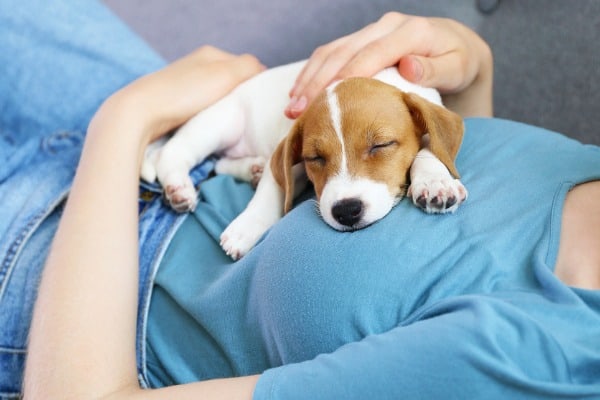
When you bring a young puppy into your home, the first few weeks can be very lonely for them.
They’ve spent their whole life with littermates and their mother, and adjusting to their new family can be taxing for all involved.
If your new puppy is a fan of napping near your face or on your head, they might just want to be as close to you as possible.
A young puppy may also be comforted by the sound of your breathing and seek to get near your face.
Letting a young puppy in your bed overnight isn’t the wisest idea, mainly because they can’t hold their bladder overnight until they’re older.
A puppy could wake up and pee in your bed without waking you up at all.
Crate training in the early days provides a better structure for you and the puppy. However, napping with your new puppy is a perfect way to strengthen the new bond you share.
If the puppy likes to nap on your pillow next to your head or on your head, it’s a judgment call on your part.
As long as you’re comfortable, and the puppy adjusts to the crate at bedtime, then there’s no harm in it.
A new puppy might also take residence on your face or pillow to get attention. This is a social behavior and most often indicates they want to play.
Some young adult dogs will do the same thing, but it is more commonly seen in puppies under a year old.
3. They’re After the Pillow
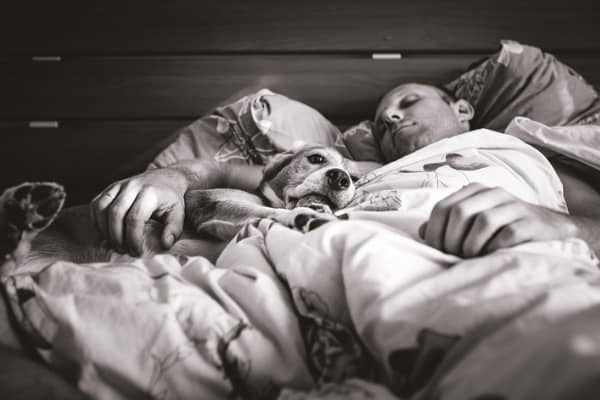
Why does my dog sleep with his head on my head?
Your dog might be more interested in the pillow under your head than your head itself.
Curling up on or near your head could be about getting some of that sweet pillow real estate.
This goes back to your dog being accustomed to sleeping wherever they like.
Also:
If they don’t have a pillow or similar soft spot of their own, they’re more likely to seek out yours.
If the pillow is the best spot in the house in your dog’s eyes, and they’re given free roam of the bedroom, then you can expect them to try it out eventually.
It’s also possible your dog is mimicking your behavior by placing their head or their whole body – depending on their size – on your pillow.
Do keep in mind:
Your pillow will collect extra hair and pet dander if you allow your dog to use it. The pillowcases should be changed several times a week, and the entire pillow might need to be replaced sooner.
Pet parents who are willing to indulge their dogs but aren’t so thrilled with the dog sleeping on their pillow can offer the dog their own pillow.
It’s comfy for everyone involved, and let’s face it – what’s more hilariously cute than seeing a dog lying with their head on a pillow?
4. Anxiety and Clinginess
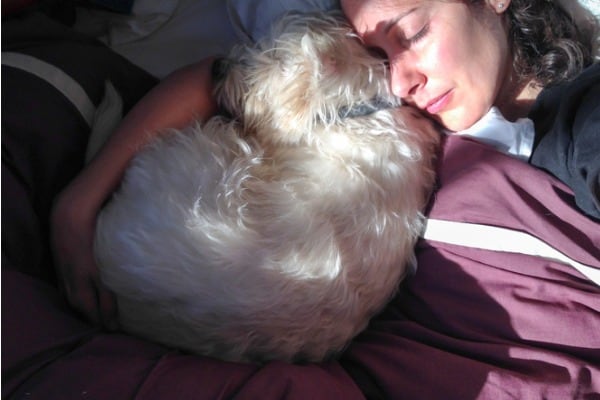
Why does my dog lay on my face?
Some dogs are a little clingy by nature, which is rarely a big issue. In other cases, clinginess can deteriorate into separation anxiety.
Dogs with moderate to severe separation anxiety frequently stick very close to their humans.
They like to sit in laps and generally stay very near anyone they’re worried will leave them.
Their anxiety drives them to want to monitor the people closest to them constantly so they are the first to know any time someone moves around the house or leaves it.
In some cases:
It will drive anxious dogs to sleep near or on someone’s head. If your dog is anxious when you leave the house, their anxiety can continue even when you’re home or sleeping.
Sometimes:
Your dog sleeping on your head could be among the first symptoms of separation anxiety.
A dog who becomes increasingly clingy can start showing other signs of separation anxiety, such as crying when you leave or being destructive when left alone.
It can be a long and challenging road to desensitize an anxious dog and curb negative behaviors associated with the condition.
One of the first steps is to stop enabling the behavior without making too many sudden, drastic changes.
Unfortunately:
Sleeping on your head can be an enabling behavior for an overly anxious dog. Of course, you don’t have to banish your dog to a crate.
It is, however, better for your dog’s overall mental health if you slowly move them to their own sleeping space.
If you move them little by little without separating them from you by a door, they will learn that they don’t have to sleep on your head to keep you around throughout the night.
5. Big Dogs
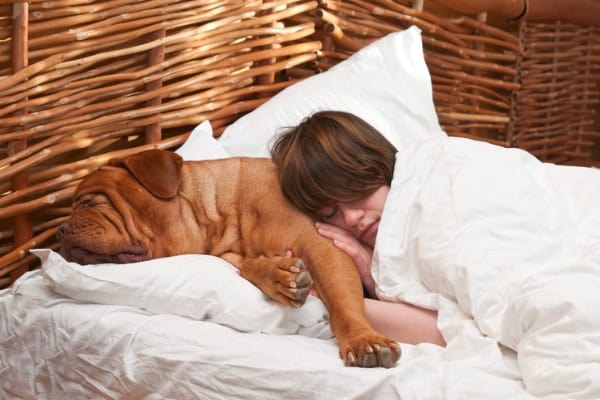
Why does my dog sleep with his head on my neck or chest?
They might want to sleep on your head or face, but with their size, your neck or chest is the best that they can do.
This is a good thing:
After all, a large breed dog on your head or face is a recipe for oxygen deprivation.
When dealing with large dogs, however, resting on your neck or chest can be almost as uncomfortable as them resting on your head.
The weight can make it hard for you to breathe or shift to a more comfortable position.
How to deal with a large dog who thinks they’re a lap dog?
Provided there isn’t any separation anxiety at play; it’s a matter of teaching your big dog that this arrangement simply isn’t working for you.
Pushing or nudging your dog into a better spot is often enough for them to get the hint and stop invading your space.
Some dogs just don’t get it, though, and will need to be given other sleeping spots until they can respect your sleeping space.
It’s not just big dogs who might need to be shown boundaries.
Though small dogs aren’t as likely to cause discomfort with their weight, they can still make sleeping difficult if they’re on your pillow or head.
A dog of any size will survive just fine in their own bed or at the foot of yours until they can be a more considerate bedmate.
6. It’s Too Cold
Does your dog love to snuggle up to your head during the coldest nights of the year?
They’re probably just trying to keep warm.
Some people have dogs who will happily burrow under three layers of bedding in your bed when it’s bitterly cold.
Other dogs aren’t pleased with being “trapped” under blankets but still want to share some body heat with you.
If you’re covered from neck to feet by thick blankets, and only your head is exposed, your dog could be sleeping on your head to share body heat with you.
This might not be an ideal solution, but neither is a cold pup.
Try a compromise by bumping up the heat or providing cozy bedding specifically for your dog.
7. They’re Guarding You
Unlike resource guarding, general guarding behavior is your dog’s attempt to keep you safe from danger.
Protective behavior can present itself with or without separation anxiety and other behavioral issues.
Some dogs are more protective by nature.
Some can even be selective on who in the house they want to guard, such as when a dog sleeps on a woman and not her husband at night.
It only becomes problematic when your dog’s protective behavior interferes with day-to-day life, turns aggressive, or encourages separation anxiety.
Otherwise:
Know that your dog could just be trying to keep a lookout for anything that might harm you by sticking close to your head while you sleep.
Bed Heads
My dog sleeps on my head – now what?
There are many reasons why your dog could prefer your head, face, neck, or chest to their personal sleeping space.
Finding out why your dog has this odd habit requires evaluating several things about your dog’s lifestyle, such as their age and their personality.
Luckily:
Most reasons your dog sleeps on your head have easy solutions, even if telling your dog no can seem difficult at times.
In the cases of separation anxiety or dogs who resource guard, some behavioral training can restore the balance in your home.
It requires some commitment, but most dogs respond well to desensitization.
What if you’re on board with this sleeping arrangement?
As long as you don’t enable anxious or aggressive behavior, and your dog isn’t putting you at risk for suffocation, then go ahead and let the pup share your pillow.
Just remember to change the pillowcases often – and maybe give the dog an extra bath here and there.
